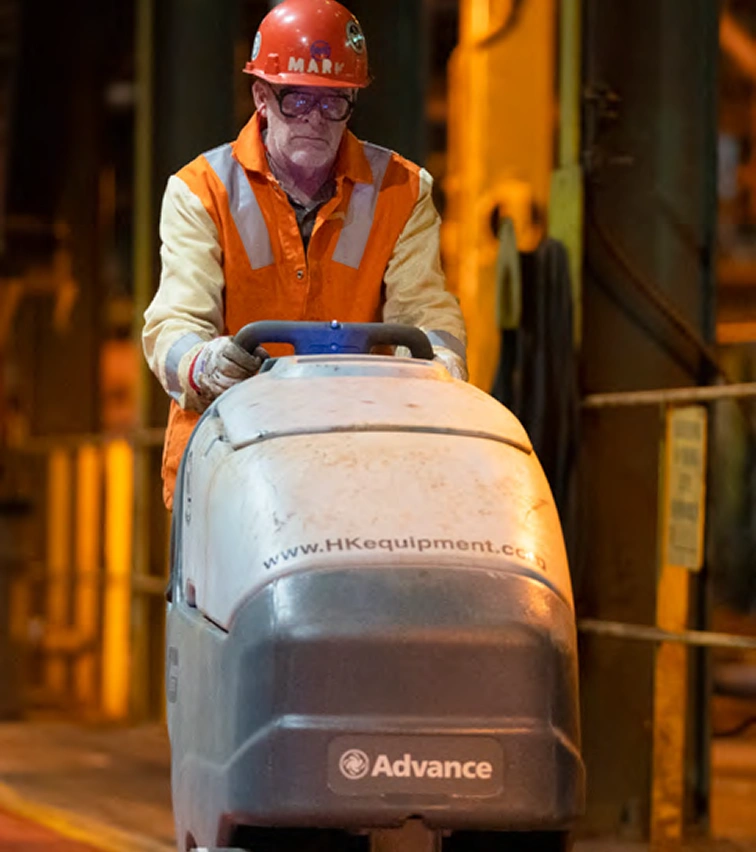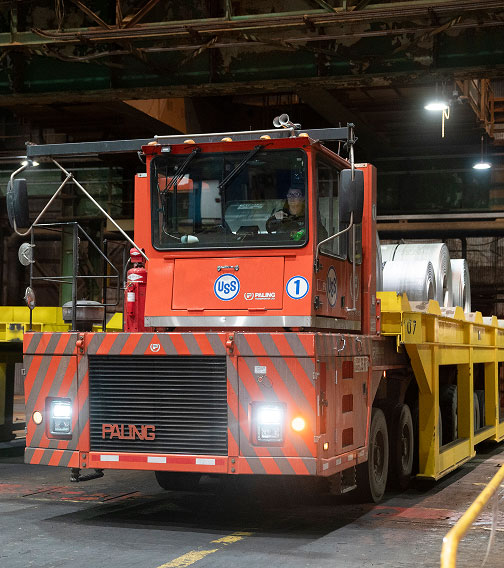Responsible Supply Chain - Sustainability.ussteel.com
We focus on resilience and ongoing supply chain management to ensure the long-term success of our business while minimizing risks and uncovering opportunities. We want our suppliers to join us in creating a sustainable future with steel.
A resilient and reliable supply chain is essential to our customer-centric approach of providing steel products that are innovative and energy- and cost-efficient. Our processes have helped us overcome multiple recent challenges, starting with the COVID pandemic and followed by supply chain disruptions and inflationary pressures.
The majority of our suppliers are located within the same state as the U. S. Steel facility they supply, or in a neighboring state. Relying on a regional supply base in this way provides us with logistical, environmental and economic benefits. Maximizing a regionally based supply chain enables our suppliers to quickly service our plants. Furthermore, we are able to leverage national agreements for cost advantages. We continue to utilize a supply chain risk management approach to identify, prioritize and mitigate critical risks.
For specific high-risk events that could halt production, we follow a rapid notification process to alert key stakeholders, including the Senior Vice President of Raw Materials and Sustainable Resources. Due to our robust risk management processes, we have not encountered any major disruptions within our supply chain and have been successful in procuring all materials needed to support our operating facilities.
In 2024, we continued to use EcoVadis to further assess supplier risk. We have worked with our suppliers to identify areas of improvement in their sustainability practices. USSK launched their program to their supply base and is continuing to onboard their suppliers to the EcoVadis platform; 47 USSK suppliers have either already been EcoVadisrated or have shared their existing scorecards with USSK.
We also began working with GEP Software to streamline procurement processes, improving cost efficiency, supplier relationships and risk management. These efforts ensure that our supply chain is both resilient and aligned with our sustainability objectives.

U. S. Steel strives to achieve the highest standards of supply chain sustainability for environmental and social criteria while ensuring the reliable delivery of our products. Our Supplier Code of Conduct specifies supplier standards for ethics, legal compliance, environmental protection, human rights and working conditions.
In 2024, our Procurement team continued to utilize the EcoVadis portal to collect data on our suppliers’ ESG policies, practices, performance and measurement. EcoVadis analyzes the quality of a company’s sustainability management system at the time of the assessment and provides a score of 1–100, with 100 being the best possible. Our initial campaign included reaching out to our top suppliers to either complete the assessment process with EcoVadis or share their existing scorecard with U. S. Steel. Our focus in 2024 has been to engage with our suppliers to improve their score in their next assessment, setting a goal for them to achieve a minimum score of 50 within the next three years. The tool identifies opportunities for improvement, and we have communicated these to our suppliers as suggestions on how to improve their sustainability practices. Overall, 72% of our supplier scores have increased since their prior assessment. Currently, 65% of our suppliers have achieved a score of 50 or greater. In 2025, we will continue to use the EcoVadis platform, with an emphasis on collecting product carbon footprint (PCF) — the total GHG emissions that a product generates throughout its life cycle — and other GHG emissions data from our suppliers.
In order to progress on our Scope 2 emissions reduction, we are currently working to both lower and verify the reduction of our purchased power GHG emissions footprint at all our plants and facilities. An important way for us to mark our progress toward this goal is through Emission-Free Energy Certificates (EFECs) conferred by our power supplier. The certificates confirm that purchased power, used for a specific time period and facility, generated no emissions of CO2, sulfur oxides or nitrogen oxides. In 2024, one of our electricity suppliers extended EFECs for power purchased in a deregulated state where key U. S. Steel facilities operate. The plants and facilities covered by the certificates include our Clairton, Edgar Thomson and Irvin manufacturing plants in the Mon Valley region of Pennsylvania; Research and Technology Center in Munhall, Pennsylvania; and our Business Service Center in Pittsburgh. We continue to work with utilities that service our plants to investigate renewable and low-carbonemissions energy projects that can help us meet our GHG emissions reduction goals.
Reduction of our purchased power GHG emissions footprint at all our plants and facilities. An important way for us to mark our progress toward this goal is through Emission-Free Energy Certificates (EFECs) conferred by our power supplier. The certificates confirm that purchased power, used for a specific time period and facility, generated no emissions of CO2, sulfur oxides or nitrogen oxides. In 2024, one of our electricity suppliers extended EFECs for power purchased in a deregulated state where key U. S. Steel facilities operate. The plants and facilities covered by the certificates include our Clairton, Edgar Thomson and Irvin manufacturing plants in the Mon Valley region of Pennsylvania; Research and Technology Center in Munhall, Pennsylvania; and our Business Service Center in Pittsburgh. We continue to work with utilities that service our plants to investigate renewable and low-carbonemissions energy projects that can help us meet our GHG emissions reduction goals.
U. S. Steel’s Big River Steel Works also advanced its supplier sustainability by working to distribute sustainability surveys to its suppliers, in order to analyze supply chain Scope 1, 2 and 3 emissions and increase responsible sourcing.
Annually, U. S. Steel submits Conflict Minerals Reporting Templates (CMRTs) for Tubular, Tin and Non-Tin to its direct customers utilizing the template created by the Responsible Minerals Initiative (RMI). The CMRT is a standardized reporting template developed by RMI that facilitates the transfer of information through the supply chain regarding mineral country of origin and the smelters and refiners being utilized.
In 2024, U. S. Steel conducted a reasonable country of origin inquiry into the source of the 3TG used in the manufacturing of its products. In making its reasonable country of origin inquiry, U. S. Steel collected questionnaires, certificates of analysis or conflict mineral s statements from all its tin suppliers and suppliers for certain of its tubular products. A review of the documentation received from these suppliers showed that the 3TG incorporated in products purchased by U. S. Steel in calendar year 2024 that were necessary to the functionality or production of its products and used in the manufacture of its products either did not originate from any of the Covered Countries or came from recycled or scrap sources. Therefore, U. S. Steel determined that no additional due diligence measures were required.
U. S. Steel will continue to monitor its supply chain to ascertain the origin of 3TG used by U. S. Steel in manufacturing its products and provide any required disclosures and updates. U. S. Steel will continue to proactively work with its suppliers and customers to verify the source of 3TG in its supply chain.
For more information, see our 2024 Statement on Conflict Minerals and related filings with the U.S. Securities and Exchange Commission
